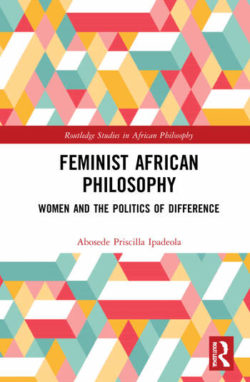Q&A with Dr Priscilla Ipadeola about Feminist African Philosophy

By Dr Abosede Priscilla Ipadeola
How has this book come about?
Books that explore and critique the intersections between African philosophy and feminist studies, with a view to mainstreaming women's issues and concerns, are rare in academia. There has been no book that has accomplished these two goals simultaneously before Feminist African Philosophy. At the University of Ibadan in Nigeria, where I was an undergraduate in the philosophy department, I noticed that the number of women academics was paltry compared to the number of men. During my Bachelor's, Master's, and Doctorate studies, I noticed that more and more women were leaving philosophy for other fields. It got me thinking about the possible causes of women's lack of interest in philosophy. My research and study led me to discover that African philosophy courses are rigidly androcentric. To diversify the curriculums, however, it was apparent that while there are many books on feminist (western) philosophy, no books were available for students interested in studying feminist philosophy from an African philosophical perspective. As a result, I decided to write a book challenging African philosophy's androcentrism and analyzing African philosophy in depth. This is one of the reasons that motivated me to embark on a project to write a book that makes significant contributions to African philosophy from a feminist perspective.
What is the key argument that your book develops?

I argue in my book that African women's liberation from patriarchal constraints and subjugation is key to contemporary Africa's emancipation and decolonisation. Although some African feminist scholars attribute all of Africa's marginalisation to colonialism, the book cites a number of compelling examples that corroborate its argument that colonialism only substantially worsened the situation, which patriarchy had already established before colonisation. In other words, colonisation is not solely responsible for African women's marginalisation, but has institutionalized and exacerbated it. As a result, if African women are liberated from gender discrimination, subjugation and oppression, many of the ideas foisted on them during colonisation would be eliminated, and Africa would be one step closer to realising the ideals of decolonisation. Consequently, the book examines how African philosophy affects the way African women are perceived and treated in society. The book Feminist African Philosophy confronts and illuminates the underlying gender-biased concepts, theories, cultural beliefs, practices, and ideas embedded in African philosophy. As an example, Feminist African Philosophy raises questions regarding why Oruka's sage philosophers are all men (and the only woman interviewed by him was not considered a philosopher), why some traditional African societies have different moral codes for women and men, why society employs different paradigms of judgement when women and men possess spiritual powers, and other pertinent questions. The book aims to develop an African philosophy devoid of androcentric content, which reinforces women's marginalisation and oppression on the continent.
What innovative or critical contribution does the book make to African Studies?
Feminist African Philosophy contributes to African Studies by interrogating African philosophy, which is an African Studies discipline. In other African Studies books on African feminism, authors explore issues related to women as they relate to African history, politics, cultures, science and religion. Feminist African Philosophy adopts a critical approach by scrutinising African philosophy as the foundation of African scholarship and worldviews. The book explores the narratives and positions of African feminist scholars, who have written and theorised from the viewpoints of history, literature, culture and religion. In terms of subject matter, Feminist African Philosophy is similar to earlier African feminist scholars' narratives, positions, and arguments. The approach and method of inquiry are, however, distinct.
In chapter two, the book examines the discourse on the appropriateness of feminism as a term to describe African women's lived experience. The book argues that if feminism is about emancipating women from patriarchal subjugation, and there are cases that support the idea that African women experience subjugation, then it is not wrong to employ feminism and use it in a way similar to how it is used in western scholarship.
Give us one quote from the book that you believe will make us go and read it?
If we are to make African philosophy relevant on the continent, then we cannot afford to ignore key issues that significantly impact about half of the total population of the people on the continent. It is therefore not an option for contemporary African philosophers to shy away from mainstreaming feminine, feminist, and women’s issues, which is what FAP strives to accomplish. – p. xiii
